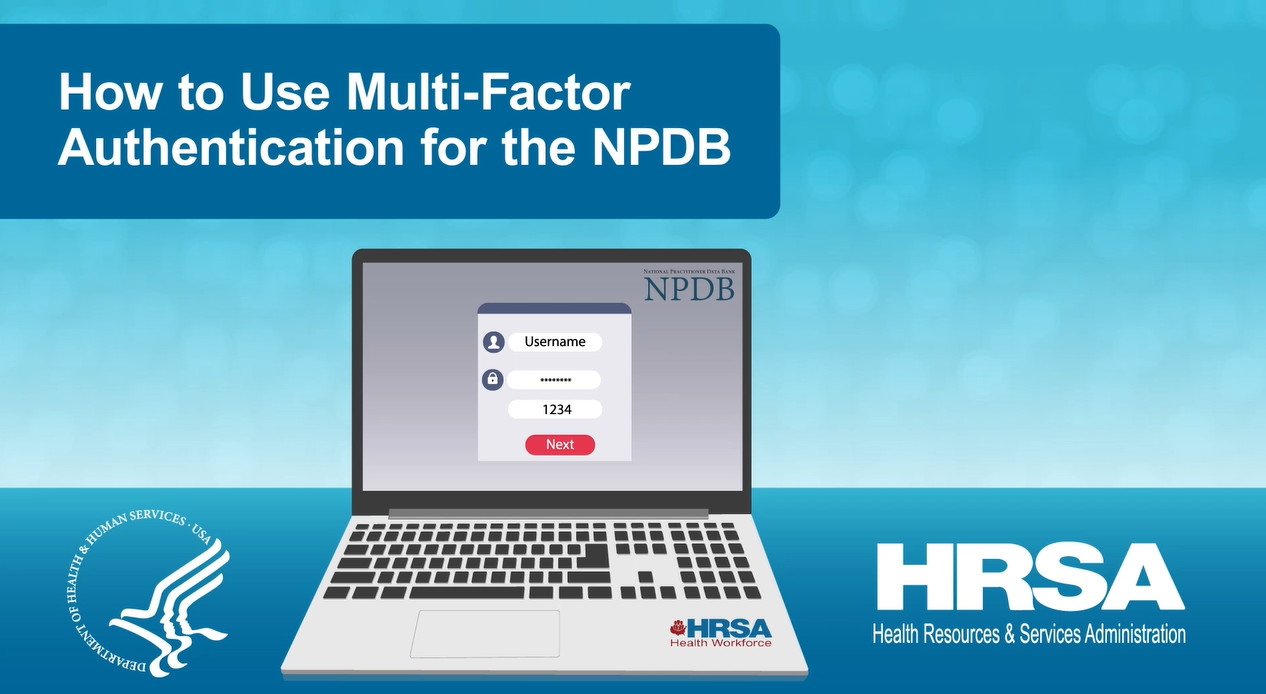NPDB Insights - February 2025

Is It Reportable?
If, as a result of a formal proceeding, a state dental board suspends a dentist's permit to administer anesthesia, should the action be reported to the NPDB?
Yes. State licensing and certification authorities must report to the NPDB certain actions (referred to as state licensure and certification actions) taken against health care practitioners, entities, providers, or suppliers. Licensure includes certification and other forms of authorization to provide health care services. Because the anesthesia permit authorizes the dentist to administer anesthesia, any licensure or certification actions taken against the anesthesia permit must be reported.
Quick Tip: You Can Only Have One Identity-Verified ID.me Account

How to Complete Identity Verification
Watch the Video (2:54)The email address that you use for identity verification will be anchored to your ID.me account. You can only have one ID.me account because a verified account is tied to you as an individual. You can add multiple email addresses (e.g., business and personal) to your single ID.me account. After completing identity verification for the NPDB, you will have the option to add additional email addresses to your verified account.
We recommend that you use a personal email address when creating your ID.me account for NPDB access, for several reasons:
- If you already have a verified ID.me account, even if you have only used it for personal reasons, you must use that same account to complete identity verification for the NPDB,
- It may be best to use a personal address to avoid additional complication; otherwise, you may not be able to access your ID.me verification in the future if your job changes, and
- If you have an ID.me account that is anchored to your email address at an organization, you may have to provide additional information to complete your identity verification for a second organization (see Duplicate account Exit Image
 ).
).
Visit our How to Complete Identity Verification video for help with identity verification,
ID.me provides the following resources for resolving issues with your account:
- What to do if you have a duplicate account Exit Image

- Troubleshooting merged accounts Exit Image

- Setting up your account for work Exit Image

- ID.me Help Center for NPDB Users Exit Image


Querying 101 for State Boards
State licensing and certification agencies, or state boards, may query the NPDB.
Why Should My State Board Query?
Querying the NPDB allows state boards to receive crucial information about health care practitioners, providers, and suppliers that they may not receive from any other source.
A query is a search for information in the NPDB regarding the subject of your query. When querying, state boards may receive information about adverse actions taken against, or medical malpractice payments made for the benefit of, the practitioner by other organizations. Having this information allows state boards to make informed decisions regarding practitioners, providers, and suppliers.
The NPDB recommends as a best practice that state boards receive reports independently, using Continuous Query or One-Time Query.
Even if a state board obtains reports from other organizations through report forwarding, without independently querying the NPDB state boards receive only a subset of the available reports and may not receive all of the practitioner information they are entitled to receive that is contained in the NPDB.
To ensure that state boards receive all available NPDB reports, enroll all of your practitioners in Continuous Query. This allows a state board to obtain real-time inquiry responses while also ensuring the integrity of the responses received. In addition, it means the state board is receiving as much information about the practitioner as possible.
For more information about querying by state boards, see our Guidebook.
When Can State Boards Query?
State boards may query the NPDB when they are
- Determining the fitness of an individual to provide health care services in their state
- Protecting the health and safety of individuals receiving health care through programs they administer
- Protecting the fiscal integrity of the programs they administer
- Considering licensing or credentialing a practitioner
How Do State Boards Query the NPDB?
The NPDB offers two types of queries for state boards:
- Continuous Query is a 1-year enrollment service that allows a state board to receive an initial query response and all new or updated report notifications for the duration of a practitioner’s enrollment, all for the same price as a One-Time Query.
- One-Time Query allows a state board to receive a query response for a practitioner. The state board will not be notified of any new or updated reports submitted to the NPDB after the initial query date.
If a state board requires applicants and licensees to submit a Self-Query response, we recommend accepting digitally certified Self-Query responses instead of mailed paper copies. The digitally certified Self-Query response displays a certification that the Self-Query response has not been altered after it was created. The NPDB is aware of recent incidents in which paper Self-Queries were intentionally manipulated by the applicant prior to submission to boards in order to hide reports.
Visit our Querying FAQs for more information about querying the NPDB.
What Information Will a State Board Receive from a Query?
State boards may receive the following types of information about a practitioner in a query response:
- Adverse clinical privileges actions
- Adverse professional society membership actions
- DEA controlled-subject registration actions
- Exclusions from participating in federal or state health care programs, such as Medicare and Medicaid
- Federal licensing or findings by peer review organizations or private accreditation entities
- Federal or state health care-related criminal convictions
- Health care-related civil judgments
- Licensure and certification actions taken by states
- Medical malpractice payments
- Other health care-related adjudicated actions or decisions
The information received by a state board via a query is intended to be used in conjunction with other sources when making decisions about its practitioners.

Non-U.S. Mailing Addresses and the NPDB
Due to the sensitive personal information contained within a Self-Query response, all paper copies of Self-Query responses must be sent via U.S. Certified First-Class Mail. Certified Mail requires a signature upon delivery to help keep practitioners' information secure.
Due to this requirement, mailed Self-Query responses have an additional fee of $13.00 and cannot be sent outside of addresses in the U.S., U.S. territories, or military addresses.
We encourage state licensing boards to query practitioners using Continuous Query or One-Time Query. However, as discussed in the article above, if a state board requires applicants and licensees to submit a Self-Query response, we recommend accepting digitally certified Self-Query responses instead of mailed paper copies. If a practitioner's Self-Query must be mailed, keep in mind that non-U.S. based practitioners will not be able to do so.
What Is a Digitally Certified Self-Query Response?
A digitally certified Self-Query response is a secure PDF that ensures the Self-Query is exactly as issued by the NPDB. Each certified PDF viewed with the latest free version of Adobe Acrobat Reader displays a certification that the file has not been altered after it was created. If any content has been altered, an error message will appear. Printed copies of Self-Query responses are not certified and will not display this certification.
Visit the following resources for more information about mailed Self-Query responses:
- How long will it take to receive a Self-Query by mail?
- Can you mail or email Self-Query responses directly to a state licensing board?
The latest updates and resources are available at https://www.npdb.hrsa.gov.
Previous editions of NPDB Insights are available in our archive.
 An official website of the United States government.
An official website of the United States government.

